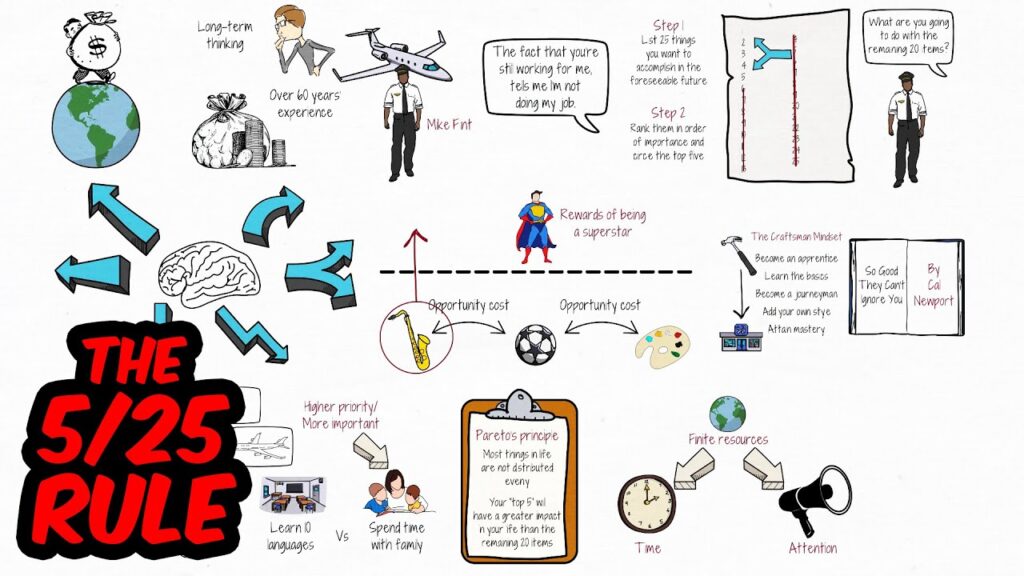Learn how Warren Buffett’s 5/25 Rule can help you prioritize and focus on the most important tasks in your life, avoiding distractions and achieving success by mastering the art of selective attention.
Warren Buffett’s 5/25 Rule: Unlocking Focus and Productivity
Warren Buffett is renowned as one of the most successful investors in the world, not only for his remarkable rates of return but also for maintaining this stellar performance over the course of more than 60 years. This track record is a testament to his long-term thinking abilities. However, Buffett’s wisdom extends beyond just stock investments; he has also contemplated how we can live more effective and fulfilling lives. One noteworthy example of his life advice is encapsulated in the story of his interaction with one of his pilots, Mike Flint, showcasing what is now known as Buffett’s 5/25 Rule.
The Origin of the 5/25 Rule
Setting Career Goals
The story begins when Warren Buffett engaged in a conversation with his pilot, Mike Flint. After realizing that Flint had been working for him for over a decade, Buffett wanted to discuss Flint’s career goals and how he could assist in achieving them. In a light-hearted manner, Buffett joked that the fact Flint was still working for him signified he wasn’t doing well enough at helping his employees achieve their dreams.
The Simple Exercise
To help Flint clarify his career aspirations, Buffett suggested a straightforward yet profound exercise. First, Flint was asked to jot down 25 things he wanted to achieve in the near future. These could be goals from any area of his life. After compiling the list, the next step was to prioritize the items, circling the top five as the most important.
While ranking these 25 things by importance was by no means an easy task, Flint managed to accomplish it. Just when Flint believed the exercise was complete, Buffett posed another seemingly simple but critical question: “What will you do with the remaining 20 items?”
Flint’s initial response was that the top five would receive his main focus, while the remaining 20, still important, would be tackled intermittently. Buffett, however, disagreed. He sternly advised, “No, you’re wrong. Everything you didn’t circle now becomes your avoid-at-all-costs list. No matter what, these things should not get any attention from you until you’ve succeeded with your top five.”
The Moment of Revelation
Buffett’s insistence on avoiding the remaining 20 items was a revelation for Flint. This advice underscored the power of selective focus, especially in a world filled with distractions and overwhelming choices.
The Importance of Selective Focus
The Problem with Distractions
In today’s world, the competition for our attention is unprecedented. The abundance of choices we face further complicates our ability to focus. As we advance in our careers, our options seem to multiply, not restrict. This scenario is precisely why many individuals fail to attain the level of success required to become superstars in their fields. Every new activity we undertake has an opportunity cost—it draws us away from what is most important.
Focusing on a Single Goal
By concentrating on a single goal, we significantly increase our chances of success. Dedicating oneself to a specific objective, investing time, and improving upon it continuously is the cornerstone of achieving mastery. This concept aligns with what Cal Newport describes in his book “Deep Work” as “craftsmanship thinking.” In traditional craftsmanship, apprentices start under the tutelage of masters, spending years learning foundational skills. Over time, they transition from apprentices to skilled workers who introduce their unique style and flair, eventually achieving mastery. Not allowing themselves to be distracted by every new fad or interest is crucial in this journey.
Applying the Principle Beyond Career Goals
While Buffett’s 5/25 Rule was initially intended to address career goals, it can be extended to other areas of life, such as health, relationships, and personal objectives. The principle remains the same—the focused effort on fewer, but more meaningful, goals yields better results than a dispersed effort across numerous less important tasks.
Can We Really Avoid Diversions?
The Illusion of Multitasking
It may appear that following the 5/25 Rule forces one into a monotonous life devoid of variety, but this is not the case. The rule only demands that you avoid other goals until you have achieved the top five. Consider all the things you wish to accomplish—learning a new language, playing an instrument, starting a business, practicing martial arts, traveling the world. While these are admirable goals, for many of us, they remain unfulfilled because they do not rank high enough on our priority list.
The Reality of Prioritization
Many of these goals are on our lists because they offer a temporary thrill or satisfaction. However, the real challenge lies in determining which goals are essential enough to persevere through difficult times. For instance, while becoming fluent in multiple languages sounds impressive, it may fail to motivate someone enough to consistently spend weekends studying grammar. Often, more immediate and impactful concerns such as work and family take precedence.
This misalignment in priorities often results in prolonged timeframes to achieve even secondary goals, ultimately leading to an extensive list of unaccomplished objectives. This accumulation of unattainable goals breeds anxiety, guilt, and pressure. Essentially, this is the “everything good” mindset at work.
Applying the Pareto Principle
Understanding the 80/20 Rule
The Pareto Principle, also known as the 80/20 Rule, asserts that a small number of causes often lead to the majority of effects. In simpler terms, the most crucial few elements are responsible for the majority of outcomes in our lives. Thus, the goals beyond our top five are unlikely to have a significant impact.
Simplifying Life
Instead of adding more to our plates, investing time in eliminating less important tasks can lead to a simpler and more fulfilling life. The 5/25 Rule exemplifies this notion—by focusing on doing more of what truly matters.
Doing More of What Matters
Limited Resources
Time and attention are the world’s most finite resources. Opportunities are abundant compared to these limited resources. It’s crucial to recognize that not all goals need to be pursued simultaneously, especially if they don’t align with our primary objectives. Irrespective of how tempting a new opportunity may be, if it doesn’t move the needle on the top five goals, it’s not worth the distraction.
When we force ourselves to delete options, we quickly discern which goals genuinely matter. The greatest benefit lies in ignoring distractions and committing to the most significant objectives.
Conclusion
Warren Buffett’s 5/25 Rule is more than just a strategy for career success; it’s a transformative approach to living a focused and fulfilling life. This method asks us to distinguish a handful of truly important goals and to dedicate our resources and attention to achieving them. In doing so, we eliminate the noise and enable ourselves to accomplish what genuinely matters, leading to a more meaningful and productive existence. By embracing Buffett’s wisdom, we can uncover the power of selective focus, achieving greater success and satisfaction in our personal and professional lives.







